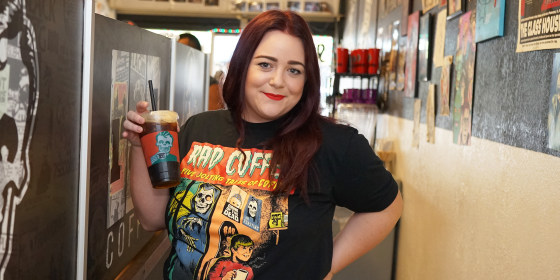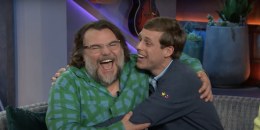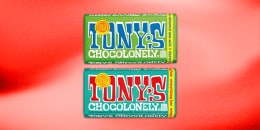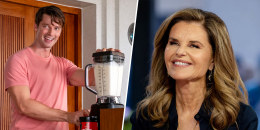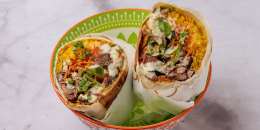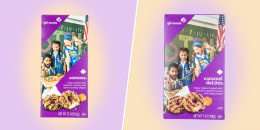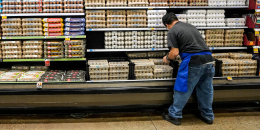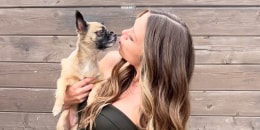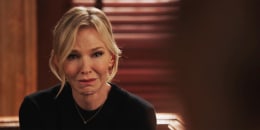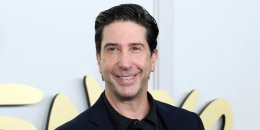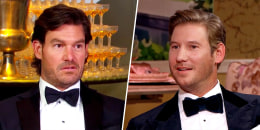We are all works in progress; even the successful women you see owning it on Instagram faced stumbling blocks along the way and continue to work hard to stay at the top of their game. In this series, we're sitting down with the people that inspire us to find out: How'd they do it? And what is success really like? This is "Getting There."
Jade Valore is the co-founder of Rad Coffee, a company she and her husband started in 2015 after they had their first child and Valore realized she didn't want to go back to working for someone else. She thought about what they loved — coffee — and started there. They came up with Rad Coffee (named for Valore's husband's frequent use of the word "rad") and incorporated all the other things they love, too: skate culture, horror movies and punk music, for starters.
Rad Coffee began as a pop-up inside of a juice store and has since expanded to include two brick-and-mortar coffee shops and a coffee truck in southern California. The company has more than 100,000 followers on Instagram, where fans are eager to show off their colorful coffee drinks in cups with skull logos. Valore has since also opened Cosmic Bakery, which specializes in vegan pop tarts. The 30-year-old mom of two spoke to TMRW about how she launched her business with financial aid money, why she credits most of her success to social media, as well as her best tips for other budding entrepreneurs.
TMRW: Did you always want to be an entrepreneur?
Jade Valore: I always wanted to create things and figure out how to make money. And that started when I was really young. I started actually painting rocks with a friend. Her mom would buy us nail polish and we would paint these rocks and then I would go door to door and try to sell them. Then I started making bookmarks and we tried to sell bookmarks. I was younger than 10 years old. I always had this kind of entrepreneurial spirit and I just didn't know it at the time because I was so young.
My motto has always been, "Do what you love for a living." I had a postcard that said that probably on my mirror for five years when I lived at home. My mantra is just to wake up and be happy everyday.
Aside from painting rocks, what was your first real job?
My first job was at Subway, which is really cool because I like Sophia Amoruso, who started Nasty Gal, and her first job was Subway. I was like, oh my gosh, that's so neat. We both worked at Subway!
Subway taught me (how to) develop a responsibility to be there and show up and have a commitment. I was only 15 years old. I remember I tried calling out sick once. And (my boss) was like, "If you call out, you're losing your job." It stuck with me forever. The owner was kind of mean, but he taught me, in a sense, you can't really bulls--t things. You have to put your all into it, if you want to make it happen. Whether that's making $8 an hour at Subway or not — it applies to everything in life.
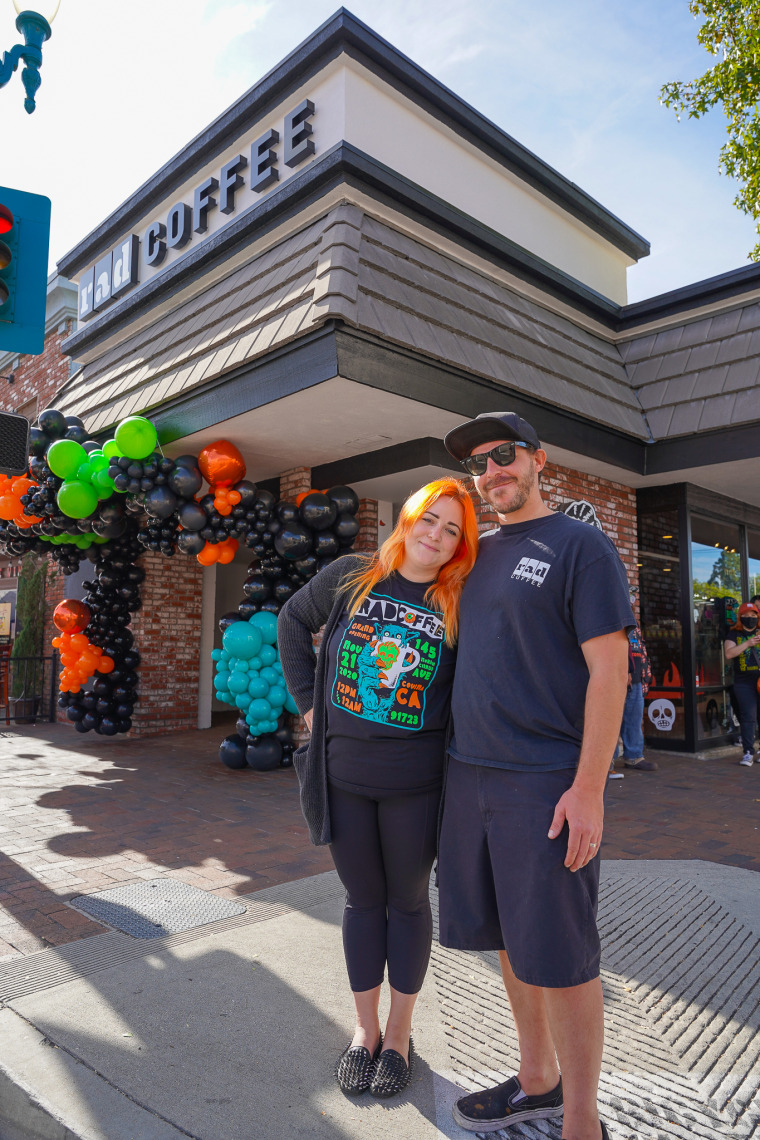
What are some of the other jobs you've had?
After high school I did background acting, because I wanted to be a director. And then I made some short films. Then I was like, OK, I'm not doing much with (acting). It's really hard to be in acting and filmmaking in Los Angeles. So I became an esthetician. I would do eyelashes at peoples' houses. I just kept trying to find things to do.
A couple years later I met my husband; we both worked at Starbucks. We got pregnant four months after we met. Saying that out loud is really extreme. We had our daughter in 2015 and I was like, "Let's try to start our own business. I don't want to go back to work. I want you home so we can raise our child together." Like, that's the perfect all-American dream — to me, at least. We love coffee, so I was like, "Let's do a coffee truck." Looking into that, it was around $100,000 to start a coffee truck. We lived in a low-income apartment with our baby. We didn't have money. We did a Kickstarter. We came up with all these ideas to get our name out. I started an Instagram. I marketed it as the first skate-themed coffee truck to come to Los Angeles. We were making our own cold brew, putting it in bottles and giving it away to people.
We didn't get the coffee truck. The Kickstarter didn't make any money. We ended up getting a little space in a juice bar and we had a pop-up bar.
What are some of the hurdles you faced while growing the business?
The first hurdle was money, because we didn't have any. We don't come from wealth. When starting the pop-up bar, we needed an espresso machine. The espresso machine we knew we had to get was top-of-the-line and we didn't want anything different because we wanted people to take us seriously. It was $6,000. We used our financial aid money from school. That's how we had some money to start. Then I did a presentation for my grandpa. I said, "Hey, help me out. Look at how much money would make if we started this. Trust me, trust me, trust me." So he trusted me, thank goodness, and he got us this espresso machine.
Once we had the espresso machine and we could start making coffee in this little pop-up space, we started making money. My husband worked 16-hour days every day. We didn't have a babysitter so I had to stay at home with the baby. We didn't have employees for maybe six months to a year.
You eventually got the truck — and even opened up two coffee shops. Was there a moment you realized that Rad Coffee was going to be a success?
It had to have been when we started the Instagram. We were getting so many followers right off the bat and people just saying, "Wow, this is so cool. I've never seen this before." When I can get that satisfaction of someone saying, "I've never seen this before," and I've created it, I know it's going to be great. That's the sign to me.
I think Instagram is 90% the reason why we're so successful.
As you've found, it's expensive to start a business. What advice would you give to someone who wants to start a company but doesn't have many resources?
Being motivated is priceless. If you really want to do something — like really, really want to do something — you can figure out a way to do it. I look at myself compared to a lot of millennials these days and I don't see as much blood, sweat and tears motivation.
"I didn't get that foundation in marketing in school. I sat on Instagram for hours and hours and looked at successful businesses. I still do that now.”
Jade Valore
I think that if somebody wants to do something and they don't have money — well, figure out how you're going to get money. I mean, I had to do a financial presentation for my grandpa! We did online school and got a bunch of financial aid. And I'm not saying juice the system, but when you go to school and they give you money, you're supposed to spend it on things to benefit you and your career and your life. If that school knew that the financial aid I got did this for me, I'm sure they'd be clapping.
What do you think is the secret to being a successful entrepreneur?
It comes down to how you're going to sell your product to your customer. If you're going to sell a black T-shirt and somebody else has a black T-shirt, how are you going to make yours shine so people want to buy yours? It has a lot to do with marketing, but I didn't get that foundation in marketing from learning it in school. I sat on Instagram for hours and hours and looked at successful businesses. I still do that now. I just started a new company. You have to teach yourself. And it's right there.
This interview has been edited and condensed.
